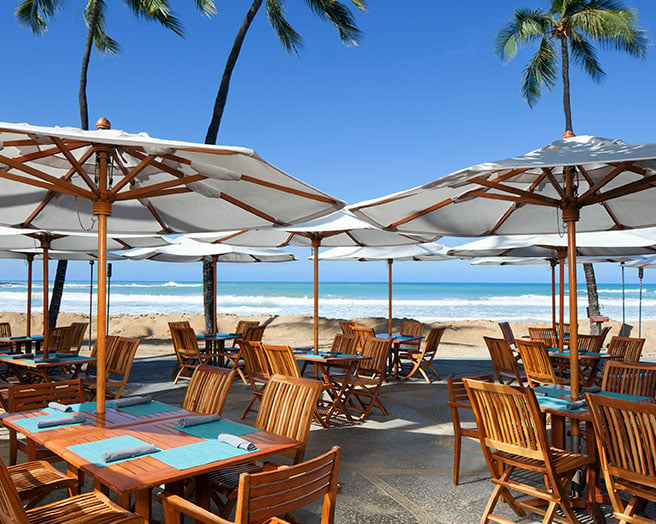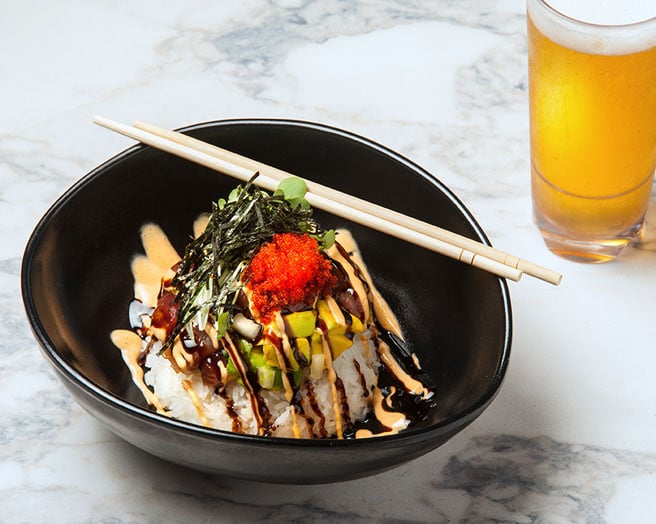Blue Mindfulness
Find happiness and health in nature or Happiness and health go hand-in-hand with nature
By Andrew Walsh
Aloha—a word rich with meaning, culture, and history. It represents an island way of life, a consciousness of caring and appreciation for the ‘āina (land), the moana (sea), and the po‘e (people). It is a practice passed down and cultivated within the Hawaiian community, both an invitation and offering to be part of something communal—a spiritual collective allowing the participant to experience a greater sense of being and wholeness with the land and people around them. To embrace the spirit of aloha means connecting the nature of one’s own being with the ebb and flow of island living.
But where does aloha come from? Is it mana (spiritual power) saturated within the porous volcanic rock and deep blue horizons of the islands? Or is it the mana all people have deep down below the horizon of their thoughts, a flowing consciousness of magma saturating the core strands of our very DNA, just waiting to erupt? Are we hardwired to look upon the beauty and grandeur of these remote islands and connect with a deep evolutionary sense of peace and comfort? Did our ancestors, be them Hawaiian or other, evolve in a world where the bounty and protection of these life-giving ecosystems was such a powerful and central component to their survival that the very smell, hues, shapes, and sounds of these places are etched deep into our genetic identities and collective conscious awareness? Much as we flinch when a spider jumps at us in the dark, have we evolved to react with a deep sense of gratitude, peace, comfort, and happiness around nature’s grandeur?
Have you ever asked yourself why staring out at the water fills you with a sense of awe, excitement, and a profound peace that you are exactly where you should be at that moment? Billions of dollars are spent to travel to these types of destinations each year. Whole industries have evolved around them—travel, tourism, clothing, outdoor gear, adventure sports, etc. Have you ever wondered why the same piece of property is 10 times more expensive on the beach than it is on the block around the corner from a factory? Why do people spend thousands upon thousands of dollars to dig big holes in their backyards and then fill them up with water? Or pay extra for an ocean view at a resort?
Is it simply for the beauty? Or is it because a compulsion deep inside the recesses of our instinctual brains will go to extreme lengths to look out and feel, smell, and see the sea or any bit of pristine nature looking back at us? Which begs the question—why do we consider these places beautiful? There is no doubt that some scenescapes are more desirable than others. So, what is it about the nature of nature’s beauty that moves us to unwind, decompress, get “back to basics,” and allow our stress to flow away like a babbling brook and our sense of happiness and contentment to rise like the mighty peaks of Mauna Kea?
We are easily lulled by the sweet siren song of nature’s masterpieces into our core state of consciousness, a mindset we fight fiercely and fruitlessly to recreate through our day-to-day triumphs and tragedies, but slip effortlessly into, like a well-worn glove, once our toes press softly into a sandy beach or the smell of sea spray fills our heads with the promise of place-based perfection. But, why? And does this have something to do with the spirit of aloha?
As scientists and spiritualists delve ever deeper into our subconscious, a few surprising and not-so-surprising trends have begun to emerge. Many credible studies have shown that nature can improve focus, performance, reduce the number of sick days, and even assist in managing pain. We are hardwired to feel healthier, more grounded, and at peace with ourselves in and around natural settings, particularly the water. This may seem obvious, as we all know that feeling of peace, contentment, excitement and energy in nature. But it turns out that people who live close to the water are actually happier than those living farther away. Just being shown pictures of the water or natural green landscapes, elicits positive emotional responses. Even the color blue has been shown to create soothing effects associated with trust and relaxation. Clearly, certain shapes, colors, sounds, feels, and smells are biologically more pleasing to the mind.
This is partly based on the fact that we have evolved over millions of years to the tactile sounds, smells, feel, and function of the natural world. But we have removed ourselves from that world in which our senses are most closely attuned. Instead, we live with hard sidewalks, images on a television, plastic surfaces, box shaped rooms, and lines of sight constantly cut short by walls and windows. But when we return to nature in any way, shape, or form, be it looking at a blue or green picture, walking in the woods, or swimming in the ocean or a river, we literally reimmerse our minds into the world which we emerged from over thousands of years of evolutionary conditioning. That is what you feel when you look out at the ocean, up at the moon, or across a mountain vista. You are home! At least your brain thinks so.
A type of peace and happiness literally washes throughout your body as the neurons and hormones of your subconscious brain fire away in rapid celebration as they recognize the forms, angles, shadows, sights, and smells that you grew from and to which you belong. A fish knows what to do in water—it swims. Just as your brain recognizes the natural environment better than any other and is therefore “happy” when it finds itself in familiar territory. That is the warm and fuzzy feeling we get staring up at the starry outline of Hawai‘i’s volcanic peaks, it’s the “flow experience” of spending the day hiking or exploring a coastal beach, it’s why we choose to live here or chose to travel here despite great difficulties. Something instinctually conditioned within each of us compels us to seek the places our brains have evolved to recognize, the places we consciously label “beautiful.”
Our minds are simply attuned to the tactile world that is most likely to aid in our survival. For most of human history, this has been natural settings. So, when we experience the full sensory onslaught of modern life, our brains don’t easily accept that these foreign sensations will lead us to safety. The result is stress. Go down to the beach, and immediately the brain recognizes the sensations it knows best, and although the natural world can be a dangerous place, we feel a sense of well-being and understanding. The belief that being near a beach can benefit one’s health is not new: doctors have been recommending trips to the shore or seawater bath treatments as early as the 18th century.
Hawai‘i’s natural dominion helps us to experience a core way of being that we all have embedded in our subconsciousness. As we connect with it, we understand the spirit of aloha: a shared experience of peace, happiness, and contentment brought forth by aligning the ancient makeup of our minds with the natural world that has sculpted us. A feeling that you belong. A feeling of aloha.
Get in Touch with Nature
Breathe your vitamins. The sea air contains thousands of negative ions, which are odorless, tasteless and invisible molecules that produce biochemical reactions once they enter your bloodstream to increase levels of serotonin and increases the flow of oxygen to your brain.
Eat fish. Research shows that people who eat fish regularly are less likely to suffer from depression. Many studies show that omega fatty acid deficiency may lead to depression. Fish is a symbol for happiness and good health in various religions and cultures and for good reason.
Take a stroll. In a study conducted by Stanford University, “The benefits of nature experience: Improved affect and cognition,” being in nature produces positive affects on a person’s well-being including reduced anxiety and rumination, and an increase in working memory performance. Simply taking a walk through a natural setting can increase performance on tasks that need sustained focus. In one test, performance on memory and attention tests improved by 20% after the subjects walked through an arboretum. Performance was also increased when subjects looked at nature photos.
Stay healthy. In other studies, experiencing nature reduced the number of sick days taken in an office setting.








